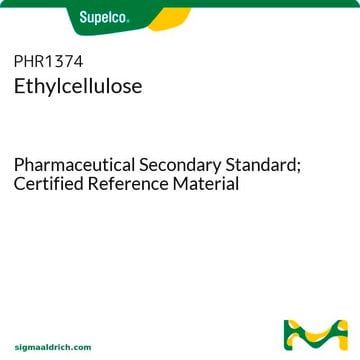247499
Ethyl cellulose
viscosity 100 cP, 5 % in toluene/ethanol 80:20(lit.), extent of labeling: 48% ethoxyl
Iniciar sesiónpara Ver la Fijación de precios por contrato y de la organización
About This Item
Productos recomendados
form
powder or granules
Quality Level
autoignition temp.
698 °F
concentration
48.0-49.5%
extent of labeling
48% ethoxyl
refractive index
n20/D 1.47 (lit.)
viscosity
100 cP, 5 % in toluene/ethanol 80:20(lit.)
transition temp
softening point 155 °C
density
1.14 g/mL at 25 °C (lit.)
¿Está buscando productos similares? Visita Guía de comparación de productos
General description
Ethyl cellulose is a non-toxic, physiologicallyinert, and stable hydrophobic polymer. It is widely used in the preparation ofsustained release matrices for drug delivery systems.
Application
Ethyl cellulose can be used:
- To prepare polymeric microcapsules of Alachlor and Metolachlor to study their controlled-release properties.
- As a core matrix to synthesize biphasic drug release nanofibers.
- To prepare wax-based solid dispersion pellets with excellent floating and sustained-release ability.
Storage Class
11 - Combustible Solids
wgk_germany
WGK 1
flash_point_f
Not applicable
flash_point_c
Not applicable
ppe
Eyeshields, Gloves, type N95 (US)
Elija entre una de las versiones más recientes:
¿Ya tiene este producto?
Encuentre la documentación para los productos que ha comprado recientemente en la Biblioteca de documentos.
Los clientes también vieron
Päivi Grönroos et al.
Sensors (Basel, Switzerland), 19(12) (2019-06-30)
Novel hot electron-emitting working electrodes and conventional counter electrodes were created by screen printing. Thus, low-cost disposable electrode chips for bioaffinity assays were produced to replace our older expensive electrode chips manufactured by manufacturing techniques of electronics from silicon or
Robert Morhard et al.
IEEE transactions on bio-medical engineering, 67(8), 2337-2348 (2019-12-17)
Ethanol ablation, the injection of ethanol to induce necrosis, was originally used to treat hepatocellular carcinoma, with survival rates comparable to surgery. However, efficacy is limited due to leakage into surrounding tissue. To reduce leakage, we previously reported incorporating ethyl
Oguzhan Gunduz et al.
Pharmaceutical research, 30(1), 225-237 (2012-09-08)
To investigate a new microfluidic method for the continuous preparation of hollow-shell nanoparticles of a hydrophobic polymer and the simultaneous encapsulation within these of a hydrophilic active pharmaceutical ingredient. A specially designed and constructed microfluidic device which facilitates at a
H V Adikane et al.
Applied biochemistry and biotechnology, 169(3), 1026-1038 (2013-01-09)
The chemical modification of developed ethyl cellulose-based membrane was carried out to make it suitable for bioseparation. The different reagents were used for the modification of membrane to couple protein A (PA) to study the purification of immunoglobulin G (IgG)
Tetsuya Ozeki et al.
Biological & pharmaceutical bulletin, 35(11), 1926-1931 (2012-11-06)
Production of drug nanoparticles is an effective strategy to enhance solubility and oral absorption of water-insoluble drugs. The handling of drug nanoparticles has been an important issue in drug formulation because nanoparticles easily aggregate each other and redispersion of these
Nuestro equipo de científicos tiene experiencia en todas las áreas de investigación: Ciencias de la vida, Ciencia de los materiales, Síntesis química, Cromatografía, Analítica y muchas otras.
Póngase en contacto con el Servicio técnico







